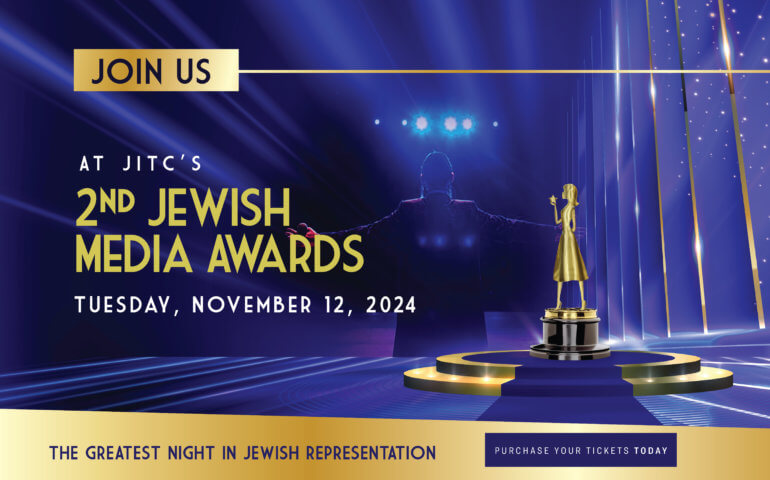
Why Jews Need Their Own Media Awards
Everyone’s talking about Nobody Wants This – the rom-com with “the hot rabbi” who loves being Jewish, the shiksa goddess who has a refreshing curiosity for his faith, and some nagging, stereotypical Jewish women and their henpecked husbands. While the series makes some improvements in Jewish representation, there are numerous problematic elements to the story.
We are painfully aware that news media and social media have exploded with horrific blood libels and lies since October 7, but Jewish depictions in Hollywood were quite problematic long before that. In the last year, Jews were represented as moneyed and scheming (“Cobra Kai”), benefiting from the slave trade (“You People”) and committing fraud (“The Bear”). The horrors of the Holocaust were joked about and minimized (“Dave” and “You People”). Jews were also depicted as insufferable, judgmental religious fanatics who are only celebrated when they have the “courage” to reject their identity (“My Unorthodox Life”). Imagine this dynamic laid over any other minority.
What if Jews could be more often portrayed as endearing individuals, with shared struggles and joy? The model for this exists for every other minority group. Starting 70 plus years ago, the NAACP founded the first Hollywood Bureau to advocate for fair and authentic portrayals of Black characters. Decades later came NALIP for Hispanic representation, MPac Hollywood Bureau for Muslim representation, CAPE for Asian representation and many more. The heroes of Black Panther, Encanto, Rami, Shang-Chi are just some of characters who have come to the large screen in recent times due to the advocacy of Hollywood Bureaus. None of their characters are perfect, but they all defy stereotypes and show pride in their identity, as well as characteristics like empathy, loyalty, charm or honesty.
While authentic casting became the norm for every other group, multiple biopics, like Maestro and Oppenheimer came out recently, with gentiles playing Jewish parts sometimes with the help of rubber schnozes. Blackface and other forms of appropriation became verboten several years ago, with celebrity apologies and television episodes pulled out of circulation. Contrast this to Jewface – using Jewish garb, affect and/or prosthetic noses, by Jews and gentiles alike – to portray a “Jew.” Jewface is alive and well, even though its origins are parallel to blackface. “Stage Jew” began in the 1600’s in Shakespearian productions, when white actors would dress in Jewish garb and noses to denigrate Jews. Then, in the 1800’s, the term “Jewface” was coined when Jewish appropriation was done in vaudeville-style minstrels, both in Eastern Europe and the U.S. Either authentic casting matters or it doesn’t. Either appropriation is a problem or it isn’t. There can’t be one rule for everyone else and a different one for Jews.
Attacks on the Jewish community don’t just end on the screen. The most lethal assaults against American Jews have occurred in the last five years. According to recently released FBI Hate Crimes Data, starting in October 2023 through September 2024, Jews became the most attacked minority group in the US, despite being only 2% of the US population.
While one popular trope is that Jews run Hollywood, sadly, many of the Jews that are in Hollywood seem to have internalized so much Jew-hatred and shame that the depictions we often see are caricatures, who are often insufferable and not fully human. Non-Jewish writers and producers are also guilty of perpetuating Jewish stereotypes. A casting director recently told me that Jewish actors usually play down their Jewishness, lest it negatively impact their career. In an age when every other marginalized group is proudly leading into their identity, when will Jews be ready for this too?
A well-written TV or film character who is authentic and nuanced can make a profound impact on viewers, as the screen can be a conduit to building a relationship of admiration and respect with characters from backgrounds viewers might never come across in real life. Impact reports show the correlation between representation and the opinions audiences hold of minority groups. This is why our organization launched the first and only Jewish Hollywood Bureau in 2021.
Like our peer organizations, we hold panels at Sundance, do studies on bias (our Norman Lear Center study on Jewish characters in US scripted TV from 2021-2022 is about to be released), speak on panels, attend DEI seminars at studios and the Television Academy; JITC Hollywood Bureau also holds Media Awards, to celebrate the progress being made, in the likes of the NAACP Image Awards (now in their 55th year), GLAAD Media Awards (now in their 35th year) and many, many more. Our 2nd Jewish Media Awards is on November 12 at Lincoln Center. Some of our sponsors include Disney, Paramount and the Daniel Loeb Foundation. Disney, Paramount, Netflix, Amazon, and Sony execs are all confirmed, as are stars, showrunners, directors and/or producers from all the shows and films we’re honoring.
Jews don’t control Hollywood, but they founded it. They founded it because more prestigious industries – like publishing, law, medicine, real estate, and others – shut them out due to antisemitism. The Hollywood founders hid their Jewishness, assimilated and relied on self-deprecation to survive. We are leading the way in helping today’s Jews lean into their heritage and demand proud and authentic representation. We hope that when Jews see their heroes on the screen, they’ll be overcome with self-love, and then the world will follow.
To learn more about JITC’s 2nd Jewish Media Awards or purchase tickets, please visit JITCHollywoodBureau.org. See you on the blue carpet!
If you found this content meaningful and want to help further our mission through our Keter, Makom, and Tikun branches, please consider becoming a Change Maker today.







